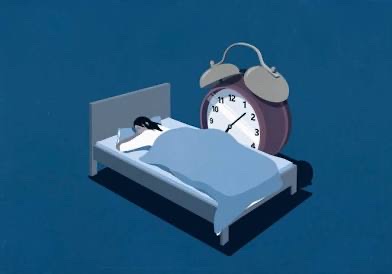Sleep is vital in our daily lives, and good sleeping provides us with better physical and mental health. When you wake up, your mood and the way you feel reflect how well you slept the previous night. As you sleep, your brain stays active throughout the night “playing a housekeeping role that removes toxins in your brain that build up while you are awake” (NIH). Sleep is a necessity in our lives, and an inadequate amount could harm our disease resistance.
Specifically, the lack of sleep affects all of our body systems, although it mainly affects the endocrine, circulatory, nervous, and respiratory systems. The circulatory system pumps blood, provides nutrients and oxygen to our cells, distributes heat, and helps fight infection and sleep has a crucial impact on it.
When we are asleep, our parasympathetic nervous system, the autonomic nervous system, takes control over our body, and we enter Rapid Eye Movement (REM) sleep. There are different amounts of REM sleep typically occurring at night, specifically the National Heart, Lung and Blood Institute states, “During REM sleep and when waking, your sympathetic system is activated, increasing your heart rate and blood pressure to the usual levels when you are awake and relaxed. A sharp increase in blood pressure and heart rate upon waking has been linked to angina, or chest pain, and heart attacks” (NIH). Through REM sleep, it depends on different external factors, such as temperature and the time of day one sleeps. Dreaming occurs in this trance. To maintain this state, our brain sends signals to the spinal cord, which temporarily shuts off any movement between our arms and legs. Additionally, REM sleep makes our muscles become “numb” to prevent us from moving, injuring ourselves, and not acting out our dreams. Sleep deprivation affects our responses, such as the ability to learn, memory, and emotions.
Sleep relates to the endocrine system as well. This body system secretes hormones, substances made from different glands that control bodily functions. When the optic nerve senses any morning light, our body secretes the hormone called cortisol, which provides us with alertness throughout the day. In contrast, the suprachiasmatic nucleus sends a signal to the Pineal Gland, which secretes melatonin at night, giving us that sleepy sensation. Moreover, the lack of sleep affects teens and children more negatively due to the pituitary gland controlling sleep regulation. According to Mary L. Gavin, MD, “lack of sleep also can affect other hormones. Studies show that sleep deprivation is linked to weight gain and diabetes. Experts are looking into whether this link has to do with hormonal changes” (Teens Health). Through these changes in the body of many teens begin with puberty, ultimately through the lack of sleep, it gets suppressed due to the lack of a specific hormone, Growth Hormone, GH, which ultimately affects different hormones in our bodies, disrupting our homeostasis, also known as internal equilibrium within the body.
Additionally, sleep plays a critical role in maintaining a healthy respiratory system. During sleep, the body experiences deep relaxation which allows respiratory muscles to rest. With that ability, it enhances lung function and oxygen exchange. Adequate sleep helps regulate breathing patterns, ensuring the body receives sufficient oxygen and effectively removes carbon dioxide. Quality sleep supports the immune system, reducing inflammation in the airways and lowering the risk of respiratory infections. Sleep deprivation can lead to respiratory issues, including impaired lung function due to conditions such as sleep apnea, which disrupts normal breathing and can strain the respiratory system.
Waltham High School students were surveyed regarding their sleep habits. The overall goal was to observe the different sleep patterns of each individual and to determine if learning about the dangerous health issues related to poor sleep would motivate them to change their sleep schedules. The question, “Sleep is crucial for everyday tasks; without it, our brains do not function properly. Lack of sleep is linked to many chronic health issues. By learning more about these issues caused by inadequate sleep, would you change your sleep schedule to receive appropriate sleep? Please explain below what changes you would make,” clearly emphasizes the lack of education on the importance of sleep.
Many students’ responses indicated that they did not care about it at all, and the majority preferred using social media at night rather than getting a good night’s sleep. Waltham High School sophomore Priyanka Mannan discussed her ideology on how sleep impacts her. Mannan stated, “I realized sleep was one of the most important things my body does. By receiving adequate sleep every night, I feel great during the day, and I begin to perform better academically due to feeling more awake.” As Mannan experienced, improved sleep can allow students to perform better academically, enabling them to succeed even more without having to deal with a tired mindset and body.
Sleep plays an important role throughout our lives, and getting an adequate amount of it is a necessity in our daily lives to complete different tasks throughout the day. Just getting 8+ hours of sleep could completely change your lifestyle and your ability to avoid being diagnosed in the future with many chronic diseases because of not voluntarily deciding to limit distractions and fall asleep. Prioritizing adequate rest not only enhances the physical well being of students but it provides a more productive and focused mood in students. By recognizing the importance of sleep, students can believe in themselves to achieve greater success in their studies and overall health.






